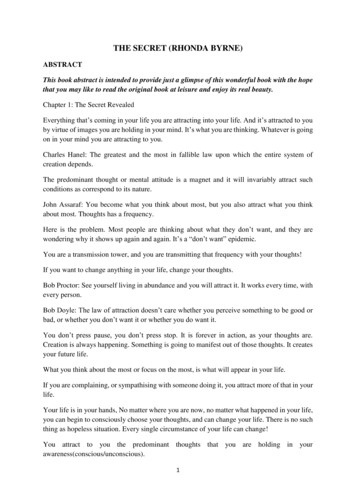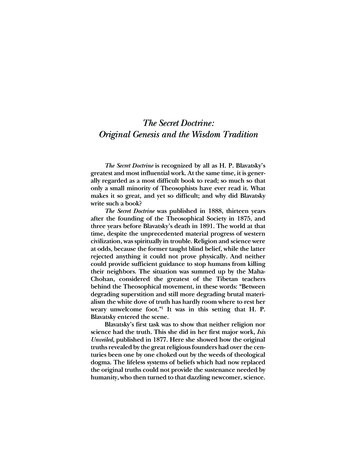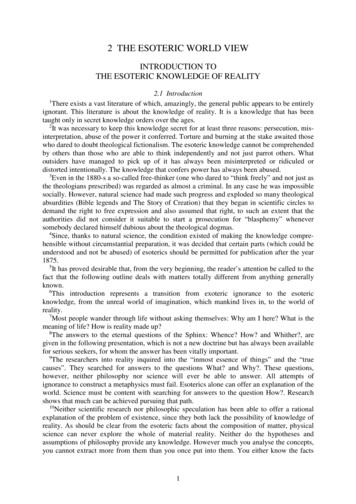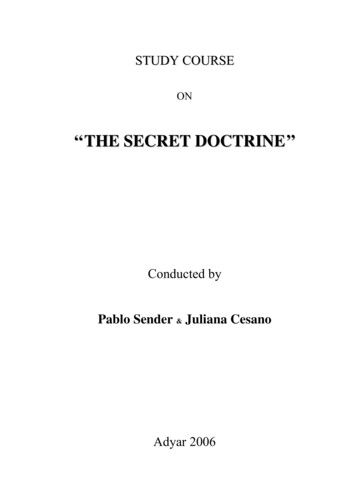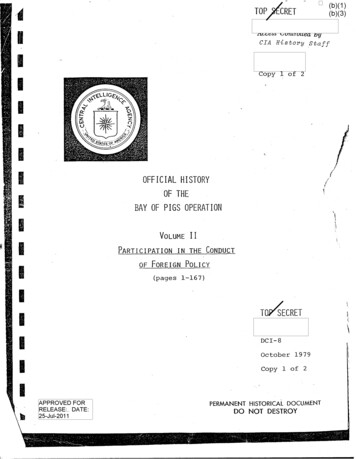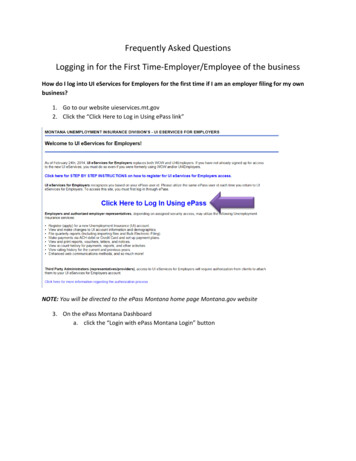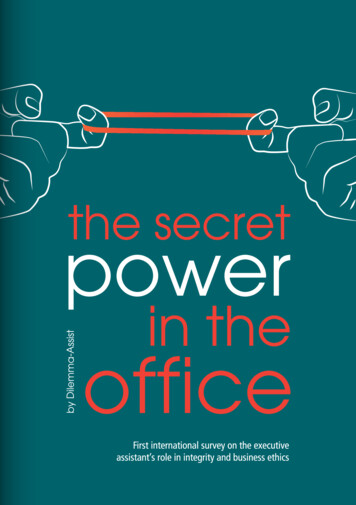
Transcription
the secret powerin the officeFirst international survey on the executiveassistant’s role in integrity and business ethics
IndexPreface4Executive Summary6Overall Results8- Executive Assistants, their spider role- Misconduct, causes and consequences14- Personal integrity dilemmas21- Organisational culture and personal relationships27Recommendations34Background and Methodology36- Respondent Demographics4Copyright Dilemma-Assist 2018All rights reserved.No part of this publication may be reproduced, stored in an automateddatabase, copied or made public in any other way, without prior writtenpermission from the authors.CopyrightDilemma-Assist (Brigit de Lange, Ingrid de Jong-Kraal)DesignCarola Straatman grafisch ontwerpPrinted byDrukkerij van Deventer836IMA40Adecco Top Secretaries42KPMG44About Dilemma-Assist453
Preface4It is with great pleasure and pride that we share with you in thisreport the results of our unique Integrity Survey among executiveassistants.The results of this survey will stimulate and intensify the efforts ofDilemma-Assist and our mission to further motivate and educateexecutive assistants to play that important role as spiders in the web.The inducement for this survey were the common activities of ourwebsite Dilemma-Assist and the Dutch members of the IMA-network(International Management Assistants) regarding business ethics andintegrity.We like to thank Dutch professors of corporate governance andleadership Kees Cools and Erik van de Loo for their guidance andsupport in realising this survey and analysing the results that arepresented in this report.The survey was aimed at analysing the professional role and personaldilemmas that executive assistants are faced with. What is their exactrole, vis-à-vis their supervisor and towards the rest of the organisation,which business and integrity dilemmas do they encounter, what is theimpact of corporate culture on their role and dilemmas?Executive assistants have a very special and important role, theyserve leaders, in several ways, they have superior access to crucialinformation, they are faced with tough dilemmas. They play a pivotalrole at the highest levels of an organisation and have significant– but often underestimated – impact.The results of the survey are interesting and compelling. They showthat misconduct and integrity dilemmas play an important role at thetop of organisations. Much work is to be done in addressing theseissues and creating awareness in business ethics. In a more trustedatmosphere in which assistants co-operate with their superior as wellas education about governance and integrity, which should create aspin-off to all employees and companies as a whole. Integrity startsat the top.March, 2018Brigit de LangeIngrid de Jong-Kraal5
Executive Summary6Executive Assistants (EAs) at board level are very often not merelygatekeepers, they are frequently the ‘confidant’ or ‘trusted advisor’of their superiors. They are regularly being asked for advice, even onsuch important matters as the internal promotions or the hiring ofnew executives. EAs can be viewed as spiders in the board web.Given their pivotal role they possess superior information about most(confidential) business issues, internal politics and personal behavioursand relationships. As spiders in the web, they have an important butalso delicate position at the highest level of an organisation. They arefrequently being confronted with serious misconduct while performingtheir duties, whereby waste or abuse of corporate resources ismentioned most often. The root causes of most misconduct are thepressure people feel ‘to do whatever it takes to meet business targets’and the associate fear of missing bonuses, not getting promoted oreven being fired.Shockingly, the most common integrity dilemma that EAs are facedwith is inappropriate or rude behaviour, followed by wasting orabusing corporate resources. Only in about a third of the cases doEAs speak up and address the issue with the person involved, whentheir superior is involved that number is even lower. People are socialcreatures, in general they don’t want to rock the boat, but at the topof organisations ‘not feeling safe’, career risk, risk of retaliation are themain reasons for letting integrity issues pass without a word being said.Apparently, the working environment at the top of organisations isnot a very safe place; EAs and their colleagues do often not feelcomfortable to express themselves or to speak up when faced withinappropriate behaviour.Such behaviours and practices are related to the corporate culture,which is different in each organisation. In almost one third of theorganisations top management never or just occasionally practicewhat they preach and in more than a quarter of the work places therelationship between board members is tense or even hostile. Whenleadership to such a large extent sets the wrong example at the top,what level of integrity can then be expected from all other colleagues?Our study indicates that board members, top executives, couldcherish and nourish their EAs, their gatekeepers and confidants,much better than they do today. These spiders in the board webhave superior information about business issues, internal politics,misconduct and behaviours of colleagues. They can act as mirrorand a safe source of professional feedback. They can help you to bea better performing board member, to fight misconduct and betterdeal with integrity dilemmas.7
Overall results‘Executive Assistants, spiders in the board ryourrole?role?HowThis unique international survey amongst Executive Assistants(EAs) reveals in what ways they are faced and deal withintegrity dilemmas and misconduct in their organisations andhow that is related to corporate culture and the individualrelationships at board level.Executive Assistants, their spider role8The role of EAs is often viewed as a gatekeeper towards their superior.That is indeed also roughly confirmed by our survey, since that’s how68% of the respondents see their role. However, being a gatekeeperseems to be just the basis, the bread and butter, of their existence.Interestingly, 71% see their main role also as a “confidant” of theirsuperior, followed by “trusted advisor” (68%) and no less than 51%view themselves as “an important source of information’’ for theirbosses. Moreover, EAs expect that also their superiors themselvesview their EAs as being their confidant (66%), trusted advisor (58%)and important source of information (46%). See figure 1. and figure 2.Howdodoyouyouseeseeyouryourrole?role?Howfigure 2.9In addition, 51% of the EAs indicate that their bosses occasionally,regularly or always seek their opinion on such important matters asappointments of new hires or internal promotions. Also, in regardto such a delicate matter as assessments or professional judgementson other board members and managers, 48% or the EAs are beingconsulted occasionally, regularly or always by their direct superiors.On organisational issues EAs are occasionally, regularly or alwaysbeing asked for their advice or opinion even 72% of the cases, asimilar percentage as for communication and reputational issues.A critical or countervailing attitude of the EA is 72% occasionally,regularly or always being appreciated by their superior.See figure 3. and figure 4.figure 1.How does your superior see your role?
MyonMysuperiorsuperiorasksasks forfor mymy opinion/judgementopinion/judgement onMy superior asks for my opinion/judgement onIt is clear from these results that superiors often have a very importantand confidant relationship with their EA. They rely on their EAs viewsand unique knowledge of the organisation and on their professionaljudgement on the behaviour and functioning of board members.44% of EAs have access to all of the business related informationof their superior. See figure 5.Accessbusinessrelatedrelated informationAccessbusinessinformationfigure 3.10A critical/countervailing attitude towards my superior isbeing appreciated11A critical/countervailingattitudetowardsmy superioris beingA critical/countervailingattitudetowardsmy superiorisappreciatedbeingappreciatedfigure 5.Have you seen any misconduct in the past 12 months?figure 4.
interviewMaureen Maloney(1956)12“It felt as a dilemmabecause you had towatch every step andword you were sayingor writing at the office.”Academic Support Assistant University of Cambridge.Maureen worked at the political office of MargaretThatcher in the period 1983-1986. Before that, sheworked, among others, at the Conservativeheadquarters and for a Member of Parliament.In 1983 she moved to join 3 other colleagues atthe political office at 10 Downing Street, London.What differed 10 Downing Streetwith an ordinary office?We were not allowed to bring visitorsor allowed to take any photos andwe were all security checked by thesecret service, MI5. Besides that wehad wonderful Christmas parties inthe official State Rooms and in the‘Pillard Room’ we sang Christmascarols with the Prime Minister!With a few colleagues we visitedAlthorp House, the estate of thearistocratic Spencer family of LadyDiana, Princess of Wales and wewere invited to a Royal GardenParty at Buckingham Palace.What was Margaret Thatcher’sstrength in your opinion?Thatcher’s strength, no doubt, washer determination and conviction,what she probably needed to keepher position in a man’s world.And her weakness?She could be stubborn andsometimes did not listen to others,especially in her last political days.Have you ever faced a dilemmain your job?Yes, the press was always trying togain answers and information fromus. It felt as a dilemma because youhad to watch every step and wordyou were saying or writing at theoffice. You had to respond but youwere not allowed to give too muchinformation away.How did you deal with that?Besides being very careful, we werelucky to have a switchboard. So noone could reach us by phone directly.But also the operators on theswitchboard were often pesteredby persistent journalists. We had tostay polite but firm. Therefore weworked with a lot of standard repliesby mail and by phone.Do you have any general tipsfor the young professionals?Try to be happy and friendly towardsyour superior and colleagues.Be helpful and stay open forcommunication and listen, so thatpeople can and will speak to you.13
Misconduct, causes and consequencesAlmost half - 48% - of the respondents indicate they have hadfirst-hand knowledge of some form of serious misconduct in thepast 12 months. See figure 6.Havemonths?Haveyouyouseenseen anyany misconductmisconduct in the past 12 months?figure 6.14The most common type of misconduct is wasting or abusing theorganisation’s resources (32%), followed by engaging in activities thatpose conflicts of interest (14%) and abusing confidential information(13%). The EAs also indicate that only 17% of them have the mostknowledge about misconduct, while in 30% of the organisationstheir superior is most informed about misconduct. See figure 7.WhoknowledgeaboutaboutmisconductWhohashasthethe mostmost knowledgemisconductatyour levellevelofofthethecompanycompanyat yourConsequently, the percentage of organisations where seriousmisconduct is witnessed at the top level can be assumed to besignificantly higher than 48%, perhaps even as high as 65% and75%, which is consistent with earlier studies* in this area.The phenomenon of misconduct is clearly a pervasive threat. Thevarious forms of misconduct that are reported undermine the integrityand the trust that people have in their organisation. This poses aserious threat to at least two thirds of the organisations that arerepresented in this study.Only when the root causes of misconduct are known does it becomepossible to attack that phenomenon in order to regain trust, integrityand to sustainably boost longer term performance. The main causefor misconduct is the pressure people feel “to do whatever it takes”to meet business targets (32%), followed by a lack of understandingof the standards that apply to their job (31%) and the belief thatpolicies and procedures are easy to override or bypass (26%).Dysfunctional procedures and ineffective working standards are 2of the top 3 causes of misconduct. See figure 8.Which types of misconduct over the last 12 months have youpersonally seen or have you first-hand knowledge about?Wasting, mismanaging, or abusing the organisations’s resources32,4Engaging in activities that pose a conflict of interest13,7Mishandling confidential or proprietary information12,7Breaching employee privacy8,8Falsifying expence reports5,9Making improper payments or bribes4,4Violating environmental standards3,9Stealing or misappropriating assets3,4Falsifying or manipulating internal financial reporting information2,9Engaging in anti-competitive practicesMaking false or misleading claims to the public or media or investorsProviding regulators with false or misleading informationProving misleading product quality or safety test resultsBreaching customer or consumer privacyfigure 7.figure 8.*Integrity survey 2013, KPMG Forensic21,5110,515
In most cases the issue is not that the procedures and workingstandards are unclear or difficult to adhere to, but people just chooseto ignore or deviate from them in order to realise their individual portedthatthattotoThose individual goals and associated misconduct are often driven bypressure to perform. The reasons for misconduct that are most oftenmentioned are all related to various forms of pressure to produceresults and meet targets, such as “believe people will be rewardedfor results, not for the means used to achieve them”, “fear of losingone’s job targets are not met”, “urge to realise bonus targets” and“fear of not being promoted if business targets are not met”.Decades of (academic) research** have shown that the standardpractice of using business targets causes perverse and dysfunctionalbehaviour and non-real or short-term results. Also, our results indicatethat these dysfunctional corporate practices remain deeply rooted inmany organisations.16Finally, not less than 13% of the respondents indicate that certainmisconduct occurs because they are believed to be part of thecorporate culture.In such organisations people are expected to lie, cheat, etc. as part of‘normal’ corporate behaviour and in order to perform according toexpectations. In these cases, a fundamental cultural and behaviouraloverhaul of the organisation and its people seems warranted.How do EAs subsequently react when they witnessed misconduct?16% will never inform their superior and 19% will do so onlysometimes. Strikingly, 23% of the EAs will even never inform theethics or compliance hotline. See figure 9.** E.g. On the folly or rewarding A, while hoping for B, Steven Kerr, The Academy of Management Executive, 1995, Vol.9, No.1. Payingpeople to lie: the truth about the budgeting process, Michael Jensen,European Financial Management, 2003, Vol.9, September.17figure 9.I have personally faced integrity dilemmas regarding“Integrity is simply the will not todishonour one’s own identity.”Erich FrommGerman/American philosopher and psychologist
interviewTrudy van Dijk(1952)18“I am known as strict.For me, that is a matterof preservation of life.”Trudy worked at the office of the Dutch ministers Zalm,Bos and Dijsselbloem for many years (1999-2017).Before that, she worked among others at theheadquarters of the Prime Minister and companiesinto the petrochemical industry. September 1999 shestarted to work for minister Zalm.Have you, in your role assecretary of the Minister ofFinance, ever faced a dilemma?Dilemma is too big a word for me.I never ended up in ‘situations’.Affairs and mistresses, you hear thestories, but never with the ministersthat I have served for eighteen years.The only ‘sneaky appointments’ thatI experienced were those of GerritZalm in 2004 with Lodewijk de Waalof the FNV. They wanted to speak toeach other in places where journalistscould not find them. You source alocation and then enter an excuse inhis diary that he is not at the office.you do not really want to do. Forexample, a minister with whomyou do not click asks you, on yourfree Saturday, to print out all thenecessary documents that arerequired. Your professional consciencetells you to do this. And you findyourself going in again on Sundaymorning because there was so muchwork that you did not finish it onSaturday night. But I also have mylimits. Once when a high publicservant said to me that the Minister’stie was really awful and he asked meto tell him that. Well no!With strangers, I am always careful.When people ask what I do, I saythat I work at the Ministry of Finance.If they ask if I see the minister, I tellthem: “Yes I sometimes do”, butnothing more. I do not want to beembarrassed either. I once got abunch of flowers for my supportingwork from a political party chairmanwhich was acceptable, but youcannot accept other gifts.How did you experience yourrole as ‘gatekeeper/watchdog’of the Minister in all those years?As secretary you are gatekeeper aswell as watchdog for the Minister.His time is limited with a full agendaand everyone wants something fromhim. It’s a balance as you try to helpthe civil servants but you also haveto protect the agenda. Sometimesyou have to pressure the Ministerbecause civil servants are waitingfor documents.It is not a real dilemma, but you cansometimes find yourself in a situationwhere you have to do something thatWhen civil servants want to speak tothe Minister, I always try to find outhow necessary it is. Sliding a little19
Personal integrity dilemmaswith calendar appointments to thefront or to the back. If it is reallyimportant, I try to shorten aquarter of an hour from anotherappointment to organize it anyway.And if the Minister wants something,then you can make it happen.I started here on September 1st 1999and have served six Ministers in thoseeighteen years. Gerrit Zalm, HansHoogervorst, Wouter Bos, Jan Keesde Jager, state secretary FransWeekers and the last five yearsJeroen Dijsselbloem.20Of course there are differences. Oneliked to go home reasonably well ontime, another preferred to arrive at10 o’clock in the morning with plansto meet with officials at 7 o’clock inthe evening. Our work has changed alot over the last 18 years. In the timeof Gerrit Zalm all calls were receivedvia the fixed line. I can still rememberhow we entered numbers on Gerrit’sfirst mobile phone. Nowadays youhave much less insight with whomthe Minister calls. In those first yearswe only had a word processor. I couldhandle this well and did not want thenovelty of Microsoft Outlook. Nowyou cannot live without it.Have I quarrelled with civilservants?Yes of course. I am known as strict.For me, that is a matter of preservationof life. I have responsibility to arrangethe Minister’s agenda and ensure thateverything runs smoothly. If that doesnot work, I can lie awake, with notesnext to my bed about what I have todo. For example, the Minister doesnot forget his passport. But I wasnever awake from stress or quarrels.You want to do more than your bestand you worry that you might givethe Minister the wrong address orthings do not go well. Sometimesyou have really long days.How did I manage to keep up allthose years?The first three years were heavierthan the last three. Maybe I waslucky, but the Ministers I worked forwere not very stressed people. In thatsense, it was relatively easy. We neverhad screaming ministers here or otheroutbursts. I have coped for eighteenyears by finding the work especiallymuch fun. The years passed thereforequickly.When you witnessedbecameawarebehaviourof any misconductoverMisconduct,as discussedorpreviously,concernsthat EAsthe last past, have you reported that tohave first-hand knowledge of, not necessarily misconduct in whichthey play any role. In order to analyse their individual role andbehaviour we asked what kind of integrity dilemmas they havepersonally been faced with. Remarkably, inappropriate (rude,disrespectful) behaviour is the no.1 personal dilemma that EAs face.33% of the respondents have suffered from inappropriate behaviourin the last 12 months. In 9% of the cases they were also confrontedwith sexually inappropriate behaviour. Not less than 22% of EAsface inappropriate behaviour by their own superior, whereas 33%encounter such behaviour by their direct peers/colleagues. If 22% ofthe EAs is being rudely or disrespectfully treated by their own bosses,one wonders how other people within the organisation are treatedby these superiors, people that are expected to set the example andpractice what they preach. The second most prevailing personaldilemma – consistent with the prevalence of misconduct – is wastingor abusing the organisation’s resources (31%), followed by abusingconfidential information (19%) and engaging in activities that poseconflicts of interest and abusing confidential information (13%).See figure 10.I Ihavedilemmas regardingregardinghavepersonallypersonally facedfaced integrity dilemmasNote: Trudy has been knighted in the “Orde van Oranje Nassau” on her departure inNovember 2017.figure 10.21
Somewhat surprisingly, all 19 types of personal dilemmas that EAsface concern first and foremost their direct peers/colleagues, not theirsuperiors or other board members. The only exception is “makingimproper payments or bribes”, in which cases their superior is mostinvolved (4% of EAs report seeing payments or bribes). One might betempted to conclude that – in general – the level of integrity amongstEAs is apparently lower than amongst board members, but that is notnecessarily true. The reason why in almost all cases most dilemmasare faced with other EAs might also be that EAs have more frequentand less formal interaction with peer-EAs and consequently a higherchance of running into a dilemma.22Once faced with an integrity dilemma, what then? When confrontedwith a dilemma concerning a direct peer/colleague, in 33% of thecases action was taken by the EA towards that person. When thesuperior was involved the dilemma, only in 26% of the cases heor she was directly being addressed, whereas towards other boardmembers in not more than 8% of the cases the EA took any actiontowards that person.In general people find it difficult to discuss or confront each otherabout their personal behaviours. People are social creatures, wedon’t want to rock the boat, we want to be liked. One would expect,however, that a superior, for whom most EAs work 40-plus hours perweek, would pose less of a threat to discuss or even just point at hisor her behaviour. Apparently, that happens just in 1 out of every 4occurrences.Why are these numbers so low, why do people find it difficult to speakup, what are the root causes? Understanding what makes peopledecide to not take any action when faced with personal integritydilemmas can significantly help to effectively address the dilemmaand also to reduce and mitigate the occurrence of dilemmas andmisconduct. When a dilemma concerns the superior or another boardmember, “Not feeling safe enough” is the most frequently mentionedreason for not taking any action towards the person involved.“Too much hassle” is most mentioned when a direct peer is involved.In all three circumstances (involvement of superior, other boardmember or direct peer) “career risk” is the second most mentionedreason to keep one’s mouth shut. When the superior is involved “toomuch hassle”, followed by “risk of retaliation” are then mentioned asimportant reasons to stay put. Apparently organisations, in particularthe working environment at the top of organisations, are not a verysafe place; EAs and their colleagues do often not feel comfortable toexpress themselves or to speak up when faced with inappropriatebehaviour. See figure 11. and figure 12.In case you did not take any action towardsyour superior, what were the main hemainreasons?your superior, what were the main reasons?23figure 11.In n twereIn case you did not take any action towardsyour peers/colleagues, what were the main reasons?figure 12.
interviewMandy Hartwig(1971)“You are never fully partof either your colleaguesor the board.”24Mandy has a broad experience in working as anassistant to the supervisory board, within differentnational and international oriented companies.She started at WordPerfect, worked for a Captainof Industry (Free Record Shop), the Senior VP HRat Unilever, and for the supervisory Board of Riagg.Since 2015 she is working as Senior ExecutiveAssistant to the CEO and CFO at Baas B.V,Capelle aan den IJssel (Netherlands).The survey results show thatmore than 70% of the assistantsconsider their role as confidant.However less than 66% of theassistants think that theirsupervisor considers theirassistant’s role as confidantand 70% as gatekeeper.Mandy recognizes these outcomesin her own job. She works with herSupervisor, the CEO, and a team,even when personalities seemdifferent. In such an atmosphereMandy knows she can inform herCEO of trusted information thatwill be really kept confidential in theboardroom. Most of this informationis just for him and it is his decisionas to whether he will use it or not.Mandy knows that her CEO considersher as one of the colleagues as wellas his trustee. And she herself feelsvery comfortable in this ‘double role’.She says that even the role of trusteeprevails from being ‘one of them’,(her colleagues).Are you aware of a dilemmawhen a colleague tells youthings about the board orsituations in the company?“The first thought in thesesituations”, says Mandy, “is askingthat person if he or she would wantme to do something with theinformation.” If so, Mandy alwayswill wait for the right moment toshare it with her CEO, and of courseonly in his boardroom and alwayswithout revealing the source. HerCEO trusts that she only addressesrelevant information. When sharingit she always stresses the humanaspects of the information, what doesit say about the person involved?The confidential atmosphere at theboardroom really makes Mandy feelscomfortable to share certain issuesand dilemmas with her CEO.The survey shows that only 4% ofthe assistant do share dilemmaswith a counsellor or internal deskor phone.Mandy honestly reveals that in herrole it is very difficult to share adilemma with such a counsellor.She knows that in case her dilemmainvolves one of her managers it willalways be traced back to the fewpeople she works for. However, shestresses that having a counsellor inan organisation is very important.Mandy is very straight in her valuesto be respected, which even resultedin a resignation due to principle25
Organisational culture andpersonal relationshipsreasons in a previous job. That’s whyshe prefers to share her dilemmain private with the person involved.Baas company has a counsellor,an Integrity Committee, a PrivacyOfficer and the Code of Conduct.When being hired at Baas she, aswell as all other employees, signedthe code of conduct.26When she applied for this job,she selected beforehand her maincharacteristics of the company.Although she likes commercialorganisations, the human aspect– which is the case at Baas – is veryimportant for her. However, Mandyadmits that in spite of this, manymanagement supporters feel lonely.“You are never fully part of eitheryour colleagues or the board”, shesays. Most of the time this is invisible,but comes to the full in a dilemma.Another result of the survey is thatassistants are being consultedby their superior about strategicand operational matters.Mainly in communication andreputation matters. How is this inMandy’s job?In general, Mandy says, our companyhas very clear and transparent corevalues. Also regarding leadershipsstyle, illustrated by the character“Ben Baas” (Mr. Ben the Boss). Baasis very much aware of a consistentcorporate governance. Therefore,Mandy likes the initiative of DilemmaAssist to learn about the supervisor’sassistants also about governance andintegrity. Dilemma Assist’s trainingshe did was a personal update forMandy. She confirms that Baas isreally “practise what they preach”.When digging even a bit deeper, one is tempted to take a brief lookat the organisational culture in order to better understand the highprevalence of misconduct and integrity dilemmas that EAs face.And simultaneously grasping the various forms of fear and sometimeseven terror that we have seen, leading to only limited occurrences offacing and directly addressing the person involved. One indicator ofquality and standards of corporate culture is the extent to whichmanagement practices what they preach. See figure 13.Topmanagement practices what they e 13.Our survey results show that for an amazing 30% of the organisationstop management never, seldom or only occasionally practice whatthey preach. In 15% of the cases they never or seldom live up to theirown gospel. Only in a meagre 19% of the organisations managementalways do what they say. When leadership to such a large extent setsthe wrong example at the top, what level of integrity can then beexpected from all other colleagues?
RegularyAlwaysAnother factor that indicates the (lack of) openness and teamworkat the top is the quality of the relationship between the EA’s superiorand the other board members. See figure 14.Relationship superior with his peers/team-membersOnly within 35% of the organisations is the willingness to toleratemisconduct minimal and comfort to raise ethics concerns only existswithin
the secret power in the office First international survey on the executive assistant’s role in integrity and business ethics. 3 Index Preface 4 Executive Summary 6 Overall Results 8 - executive Assistants, their spider role 8 - Misconduct, causes and consequences 14


